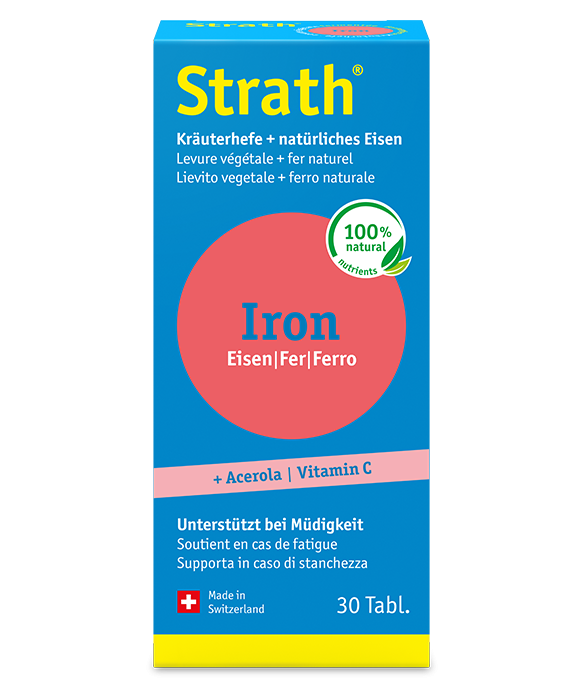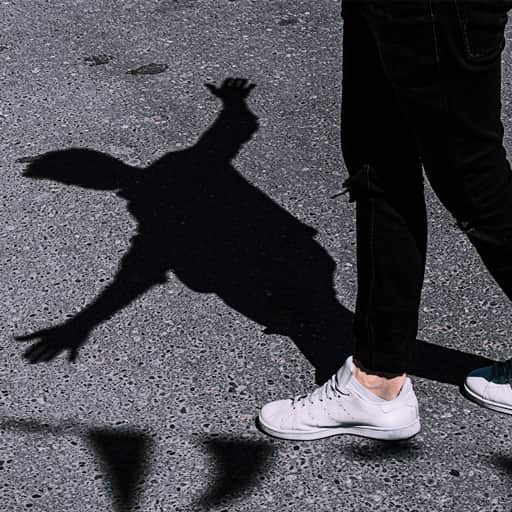Iron is a trace element and, at 2-4 grams, makes up only a vanishingly small part of our body weight. As a component of the red blood pigment, iron is important for the transport and storage of oxygen in the muscles. Various iron-containing enzymes also control the energy and metabolic processes in our body.
How do I notice iron deficiency?
Are you often tired or do you feel exhausted or unfocused? If our body does not have enough iron from food, our cells and organs are not supplied with enough oxygen. Other symptoms can be dry skin, brittle hair and nails, sore corners of the mouth or frequent infections. It often takes months before an iron deficiency occurs, as the body can draw on its iron stores for a long time. Strong growth (children and adolescents), pregnancy, regular blood loss (menstruation, chronic inflammations) and a vegetarian or vegan lifestyle with insufficient iron intake are considered risk factors for the development of iron deficiency.
Good iron - bad iron?
Our body cannot produce iron itself; we must therefore take it in with food. Here, iron comes in two different forms: The iron known as haem iron (also: 2-valent iron) from meat, meat products and fish, and "non-haem" iron (also called: 3-valent iron) from plant foods. The big difference between the two: Haeme iron can be absorbed much better by our body. The difference is the usability or "biological availability" of the iron.

Diet for iron deficiency
Beneficial for the absorption of iron
Vitamin C supports the absorption of iron. Supplement your (iron-rich) meal with vegetables rich in vitamin C as a side dish (peppers, Brussels sprouts, broccoli, kohlrabi) or fruits for dessert. Oranges, strawberries, kiwis or acerola cherries are particularly rich in vitamin C. In addition, lactic acid-fermented vegetables (sauerkraut, kimchi, pickles) or herbal yeast can also increase iron absorption.
Also, when plant foods are eaten together with meat or fish, this can additionally promote iron absorption. Therefore, combine iron-rich plant and animal foods in one meal.

Diet for iron deficiency
Inhibits the absorption of iron
Substances such as calcium (in dairy products), oxalic acid (in rhubarb or spinach), polyphenols (in black tea and coffee), phosphate compounds (in cola) or phytates (in wheat bran or wholemeal rice) inhibit the absorption of iron. Therefore, enjoy your milk- or cream-based dessert or your coffee or tea one hour after the meal. However, a glass of orange juice at the same time as your meal is helpful. Do you like to eat a lot of plant-based foods? Then soaking or sprouting grains or legumes beforehand can increase the absorption of iron.
What to do about iron deficiency?
A varied diet is the best way to prevent iron deficiency. In the case of a slight iron deficiency, a variety of iron-rich foods that you can regularly include in your meals will help. Red meat, fish and seafood, pulses and dried fruits and nuts are particularly rich in iron. The rule here is: variety makes the difference. It does not make sense to eat only iron-rich foods. It's the combination that counts!
Combining iron-containing foods skilfully
How much iron our body can absorb from food depends not only on the value of the iron, but also on the composition or preparation. Certain substances can favour or prevent the absorption of iron from food.
How much iron is in 100 grams of various foods
Food - Iron content (in mg per 100 g of food)
Black pudding 30
Dried meat 4.0
Tofu, natural 2.8
Oatmeal 3.8
Dried apricots 1.4
Chocolate (bitter) 6.7
Hazelnuts 3.6
Pumpkin seeds 8.2
Sunflower seeds 5.0
Sesame seeds, unpeeled 7.7
Sesame seeds, hulled 5.8
Spinach, steamed 2.8
Lamb's lettuce 2.1







